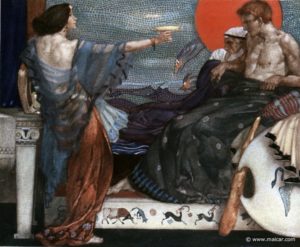Μήδεια δὲ ἧκεν εἰς Ἀθήνας, κἀκεῖ γαμηθεῖσα Αἰγεῖ παῖδα γεννᾷ Μῆδον. ἐπιβουλεύουσα δὲ ὕστερον Θησεῖ φυγὰς ἐξ Ἀθηνῶν μετὰ τοῦ παιδὸς ἐκβάλλεται. ἀλλ᾽ οὗτος μὲν πολλῶν κρατήσας βαρβάρων τὴν ὑφ᾽ ἑαυτὸν χώραν ἅπασαν Μηδίαν ἐκάλεσε, καὶ στρατευόμενος ἐπὶ Ἰνδοὺς ἀπέθανε: Μήδεια δὲ εἰς Κόλχους ἦλθεν ἄγνωστος, καὶ καταλαβοῦσα Αἰήτην ὑπὸ τοῦ ἀδελφοῦ Πέρσου τῆς βασιλείας ἐστερημένον, κτείνασα τοῦτον τῷ πατρὶ τὴν βασιλείαν ἀποκατέστησεν.
- Map
- Pre Reading
- Post Reading
- Culture Essay
Medea’s stay in Athens was short-lived. Upon Theseus’ return to Athens to claim the kingship, Medea attempts to poison him so that Medus, her son by Aegeus, inherits the throne rather than Theseus. When Aegeus recognizes that Theseus has returned to Athens after growing up in Troezen, he pushes the poisonous cup from Theseus’ hands, whereupon Medea and Medus escape to northwestern Iran and the people soon to be named after her son, the Medes.
The structure of Apollodorus’ telling of the tale had clear markers indicating the progression
from the married couple (οἱ ) to Jason (αὖθις δὲ . . .Ἰάσων) to Medea (ἡ δέ). In this structure,
Medea’s actions increase in intensity. Identify the verbal expressions, either participles or
indicatives, that show each stage in Medea’s response to Jason’s decision to remarry and
dismiss her.
Apollodorus’ retelling of Medea in Corinth is a textbook case of Greek customs on marriage,
from betrothal to marriage to divorce. What actions (verbs) describe each stage in the
relationship? Who has agency? Who is included in the decision? Even the verb γαμέω is
used differently depending on whether a man or a woman is the subject. Find the three
instances of γαμέω in Apollodorus’ story and identify its subject, voice, and meaning in each
instance.
The climax of Euripides’ Medea comes when Medea presents a monologue (Medea 1021-80)
expressing her decision whether or not to murder her children. Yet Apollodorus (and
Pausanias) offer a third option, placing them in the care of Hera Acraea. How would Medea’s
speech in Euripides’ tragedy need to be rewritten to include this option? If this option were
included in Medea’s speech, what decision do you think she would have made?
